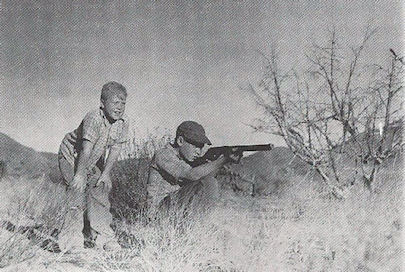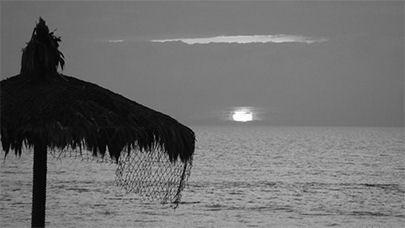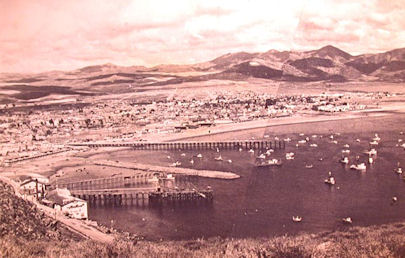 |  |
By Greg Niemann

"There’s another one," said Fritz, pointing to the sand in his authoritative manner that came with being the oldest kid in the family.
Indeed it was, another 2-3 foot long indentation in the sand where the stolen fishing rods had been dragged by the thieves.
"For sure they went this way," I answered, recognizing the obvious sign.
It was 1947 and I was only eight years old. My 12-year-old brother was a smarter, wiser, more sophisticated grown-up. At least he was to me.
But we were in this caper together, and this was not a game. We were hot on the trail of the family’s stolen fishing rods. And the signs were leading us up the beach from our camp to the small fishing village of Ensenada.
Each summer our whole family, Papa, Mama, and whomever of the eventual nine kids were born by then, spent two blissful weeks camping in the sand dunes at the mouth of an arroyo upon whose banks a slaughterhouse once stood. This out-of-the-way location was then about two miles south of the town center. In later years the environs of the city of Ensenada grew to include our camping site. In recent attempts to find the site, I concluded that we were near where the current Cueva de los Tigres restaurant now stands.
We had the sandy draw to ourselves and camped under an old weathered palapa, the only shelter in the area. At the time we didn’t even have a tent and Mama used boxes for a table and makeshift kitchen.
A privy was dug in a nearby sand dune; the ocean was our family room (this was in the days before anyone had TV anyway). For the bedroom, we merely rolled the sleeping bags out, all in a row, in the sandy area next to the palapa. The millions of stars not visible from urban Los Angeles and lull of crashing waves provided us with the evening entertainment as we drifted off to sleep.
Days were spent swimming, riding waves, beachcombing, exploring, playing "King of the Mountain" on the sandy hills and occasionally getting stuck by the tiny spines of the cholla cactus.
Mexican kids often joined us to play, just mysteriously appearing out of nowhere. At least I never figured out where home was to them. Unknown to us, we must have been watched by others too, older and malevolent, but they kept their distance during the day.

Our extended Mexican family
We enjoyed the local kids. Despite a language barrier, Francisco, Juan, Lupita and the others became part of our extended family and we learned from each other. We learned about the animals and plants, the shells and the tides. We taught words to each other. An important phrase for us was “Como se dice en Español?” which translates “How do you say this in Spanish?”
Another pastime was helping my dad and older brother catch fish. Our family was poor and the fish became an integral part of our summer diet.
Earlier my resourceful brother had handcrafted two long surf fishing rods. With permission from a woman who had a bamboo grove down the street from our Northeast Los Angeles home, he had selected two long and straight bamboo shoots.
My dad bought the metal eyes and reel holders, thread, and thick colored twine. Then Fritz spent many hours sanding and staining the rods, meticulously tying on the eyes and cramp-ons with the heavy thread. One rod had yellow and blue wrapping and the other red and blue. Both had thicker royal blue twine wrapped around the handle base. My dad then bought a couple of reels and we were in business. (As testimony to their durability, my brother recently presented me with one of the rods and I still have it – almost 70 years later.)
We caught fish daily. I say “we” because sometimes my sisters and I would take turns fishing, usually to relieve Fritz and Papa. Sometimes we’d actually be holding the rods when something hit. It was a thrill I’ve never forgotten and still enjoy.
We mostly caught perch, corvina and halibut. We also caught stingrays and shovelnose sharks. We kids became expert at digging up sand crabs for bait. Fishing became an important part of each day.
That is, until the night the rods were stolen!
At night the reels were removed and put in the old family ’36 Oldsmobile, and the fishing rods were laid to rest alongside the family for which they provided sustenance. Papa would carefully place the rods down next to his sleeping bag, in the narrow space between his and the next bag in line.

Stolen from under our noses
Then one morning we awoke to discover them gone, stolen right out from under our noses while we slept.
My brother is one determined individual. Especially when it comes to one of his hard-earned possessions. After all the excitement died down, Fritz grabbed me and said, "Come on. It looks like the tracks go this way."
We walked down to the beach and saw two sets of footprints in the damp sand taking off to the north, towards town. Occasionally there was a depression or gouge in the sand near the prints. We decided that the prints had to belong to the thieves because apparently they sometimes allowed the rods to drag in the sand, thus making the depressions. Fritz and I decided to pursue them.
This was thrilling. We were the Hardy Boys out on a great adventure. We were going to nab the culprits. Who cared if we didn’t have a weapon or a plan? We were determined.
Our minds conjured up the worst type of villains as we hastened up the beach. The tide was coming in and in a few places the prints were obliterated altogether only to reappear farther up. We moved quickly while there was still the trace.
Folks who know present-day Ensenada have to imagine that in 1947 it was just a small fishing village. Thus, when the tracks left the beach it was easy for us to see where they were headed. At the time there were a number of deep sea fishing shops along what is now the tourist shopping street of Boulevard Lazaro Cardenas. Fishermen arriving in town used to head straight to one of those shops to book trips and buy and rent equipment. The outfitters still in business have since moved to the newer fishing piers.
We kids had been in town before. In fact, we had sometimes joined other Mexican kids who used to hang out at the old pier. When the full boats came in with exuberant, high spirited fishermen, we used to line up and ask them for fish.
"Pescado," we’d say, looking imploringly at the fishermen, even though many were Americans. I was that incongruous blond kid in the crowd who would also sometimes be rewarded with a large fish I could proudly take back to camp.

Tracks led to shops
We didn’t go to the pier this day. The tracks led to the row of fishing shops.
We walked along the one main street in front of the shops, noticing that many rods were displayed in racks in front. It was the third shop where our hearts stared beating a little faster. There they were, Fritz’s custom rods, one with blue and yellow wrapping, and the other with blue and red, in a rack by the door.
"Let’s grab ‘em," I said.
"No," countered a more conservative Fritz. "They’ll just say we’re stealing them and we could go to jail. What about that?"
"Well they stole ‘em first," I said wanting a more swift justice.
"We better get Papa," advised Fritz.
So we hurried back to camp and related excitedly that we had found the missing rods. Papa and Fritz then jumped into the Oldsmobile and sped off up the sandy arroyo and headed to town. I was devastated when it was determined that I was too young to go.
At the shop, instead of a hostile confrontation it turned out that the owner was a big, gregarious friendly Mexican whose immense stomach strained his shirt. His natural smile turned to a frown as he listened with apathy to the tale of the stolen fishing rods.
He was a far better representative of the warmth of the Baja people than those who dared enter our camp. He snatched the rods out of the holders and returned them with profuse apologies, saying that he had just bought them from some young guys that morning.

My dad expressed concern that the shop owner would be out the money.
"No problema, Señor. This is a small town. I’ve seen those guys before and figured they were up to no good. I’ll see them again and they’ll be sorry," he countered.
When my dad and brother returned from town with the rods and the good news, I sulked and refused to share in their joy.
Finally I cried out, “I can track the thieves down and solve the crime, but I’m too young to go and get the fishing rods. I shoulda just taken them when I was there.”
Maybe I should have, but then we wouldn’t have met the owner, another caring Baja character who quickly became a friend of our family and remained so for years.
About Greg
Greg Niemann is the author of Baja Fever, Baja Legends, Palm Springs Legends, Las Vegas Legends, and Big Brown: The Untold Story of UPS. Visit Greg's website.